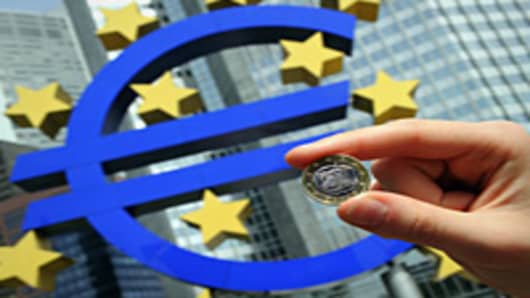The market has found its Nirvana. The Europeans have floated an idea to solve the ills of their financial world.
The European Financial Stability Facility — EFSF — was created last year to assist troubled nations.
The original funding was 440 billion euros (if all the sovereign states agree to its expansion in the upcoming votes). Since that will not be nearly enough, and since the problems have at their root excessive debt, the geniuses decided to create more debt.
The EFSF, it is suggested, can lever itself 8:1 and borrow from the European Central Bank, ECB. We're talking a couple of trillion. But don't worry, the Europeans that are having all the trouble will guarantee it. Maybe.
Chancellor Merkel has signed on to the need of extreme steps to save the Euro and said Germany will do whatever it can to help Greeceregain market confidence. This is a big change from her prior calls to punish Greece for its wasteful ways. Her commitment to the Euro is impressive in light of the popular anger over the situation.
But, and there are several buts, Andreas Vosskuhle (you remember Andy. He was always a bit grouchy) is now head of Germany's Constitutional Court. He told the local rag, Frankfurter Allgemeine, that "The sovereignty of the German state is inviolate and anchored in perpetuity by basic law. It may not be abandoned by the legislature. .....There is little leeway left for giving up core powers to the EU. If one wants to go beyond this limit....then Germany must give itself a new Constitution. A referendum would be necessary. This cannot be done without the people."
That may or may not be legally correct. It would certainly delay if not kill the concept. The markets are choosing a deal over a non-deal. But Germany still has to vote this Thursday (Parliament, not the populace) on expanding the original EFSF to allow it to buy European Union bonds and to invest in banks. The politicos will probably go along with it, but let's wait for the vote.
And isn't this a bit of a daisy chain? The EFSF creates a European Investment Bank, EIB, that forms a Special Purpose Vehicle, SPV, that issues bonds that buys busted debt. The Rube Goldberg structure strikes me as a way of getting around something. Does it circumvent German law, and the original demand by Germany not to leverage a rescue package?
Another issue is the use of leverage. Borrowing a few trillion from the European Central Bank is still the same as borrowing from the member states in that they guarantee the bank. Bailing out the profligate might not make for a real effective disciplinary lesson.
But maybe I'm just being a grouch.
I can't help but think one headline out of Europe could halt the whole market rally. Suppose a country like Slovakia says not one more penny for bailouts. We can't afford it. Wait, Slovakia did say that and the market seems not to care. I guess I am being a grouch. But watch out for this rally. I don't trust it.
I don't trust Medvedev/Putin either. Well, actually I do. I trust Medvedev/Putin to be what they are. If I go swimming in shark infested waters, I shouldn't blame the shark when he acts like a shark. Someone should have reminded Russia's Finance Minister, Alexei Kudrin, about that particular fact of life. Despite being well respected in the international financial community, he complained about the new structure and was gone as fast as Representative Anthony Weiner should have been. I trust Putin to be like the KGB Colonel he was. To do otherwise in unwise.
Vincent Farrell, Jr. is chief investment officer at Ticonderoga Securities and a regular contributor to CNBC.


